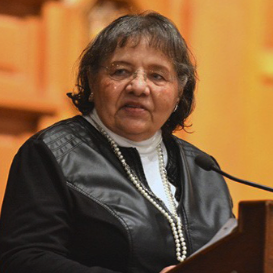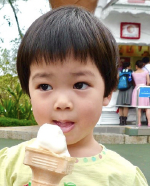On Wednesday, January 25, Yale University welcomed Ms. Diane Nash as the keynote speaker of its Annual Celebration of Dr. Martin Luther King, Jr. program, which was open to the public. Two recent Choate alumni, Uzo Biosah ’16 and Esul Burton ’16, who are now Yale students; two Choate faculty, Ms. Libby Peard and Mr. Jim Yanelli; and one retired Choate faculty member, Mr. Trevor Peard, attended the lecture.
Ms. Nash’s address, titled “Courage, Conflict, and Creative Maladjustment: Speaking Truth to Power Across Generation,” focused on how to apply the methods of non-violent resistance characteristic of the 1960s civil rights movement to today’s social crusades. “We know it works,” she said during her talk, “We have a better way to wage war.”
Biosah paraphrased Ms. Nash’s statement, “When people who are being oppressed pull out of the oppressive system, the system falls.”
A prominent activist and leader, Ms. Nash participated in and spearheaded many important efforts during the Civil Rights Movement, from a campaign to integrate lunch counters in Nashville, the first successful one of the movement, to the Student Nonviolent Coordinating Committee, which she co-founded.
Mr. Yanelli described Ms. Nash as a “civil rights legend.” Having frequently heard her name when he was younger, he saw the talk as “an opportunity to revisit history and catch up with the life of a person who had been so vital in the Civil Rights Movement and hear about her life since the sixties.”
Mr. Yanelli, as well as Ms. Peard and Mr. Peard, heard about the event through Biosah. (Burton found out through flyers posted in her dormitory.) Biosah was the Freshman Liaison and representative of the Black Student Alliance on the Planning Committee, and her responsibilities centered on publicizing the event through social media and other means, including inviting former Choate teachers and classmates.
While at Choate, Biosah was also awarded the Princeton Prize in Race Relations for her work as part of the Choate Diversity Student Association, Choate Afro-Latino Student Alliance, and Choate’s Diversity Day planning committee.
According to the Yale Daily News, during her talk, Ms. Nash outlined the six phases of nonviolent social action: investigation, education, negotiation, demonstration, resistance, and ensuring the problem cannot repeat itself.
“In sharing her story, she managed to give those committed to activism a blueprint for advancing a movement and also reason to believe that each of us can make a difference,” Ms. Peard said, “It is especially impressive how much she accomplished while a college undergraduate, an important message for students everywhere.”
With recent demonstrations, such as the Women’s March on Washington and protests at airports across the country against President Trump’s Executive Order restricting immigration from seven Muslim nations, Ms. Nash’s teachings seem especially relevant.
Burton compared these actions to the civil rights movement, “The ways we do things now are less organized — the messaging is less clear, less structured — and that could potentially hurt our success.”
Burton continued, “We see a lot of these historical figures as extraordinary, when in reality, some of these social movements happen because of all the ordinary people. That’s something to keep in mind in the next year or four years, the fact that everyone has the potential to affect their communities and the communities beyond them.”
Although no Choate students answered Biosah’s invitation to attend this event, Mr. Yanelli, the Director of the Student Activities Center, explained that he would have arranged transportation for students to attend the event.
Biosah concluded, “Protest and nonviolent action happens on a variety of scales, but I think it is really important to remain hopeful and know that there are communities that are there for you to support you. There are people who want to stand with you to move forward.”
The lecture, Mr. Peard said, reminded him of the urgency “to support the good and stand against the not so good.”




